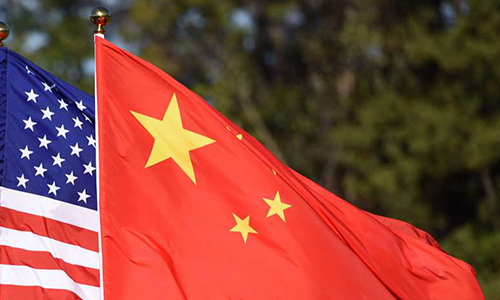
China US Photo: Xinhua
The main US business group in China on Thursday issued a report and urged China and the US to build on the momentum of the phase one trade agreement and continue to address remaining "structural" issues to help companies battered by the trade war, a slowing Chinese economy and the coronavirus pandemic.
However, while China remains open to negotiations with the US to resolve lingering issues including remaining tariffs, a slew of developments in the US including an unabating epidemic and increased hostility creates a tough environment for any meaningful discussions, a trade advisor to the Chinese government told the Global Times.
In its lengthy annual white paper on US businesses in China, the American Chamber of Commerce in China (AmCham China) said that while the phase one trade deal signed earlier this year helped ease some tensions, there are still "structural issues" that remain to be resolved in phase two negotiations.
"We hope that this deal puts a floor under further deterioration of the bilateral relationship, ends the cycle of escalating tariffs, and creates positive momentum for continued negotiations to address remaining structural issues in the economic relationship," the white paper stated, pointing to "issues" in areas such as intellectual property rights (IPRs) protection, cybersecurity and other policies - similar gradiences cited by US officials in their rationalizing of the trade war with China.
Chinese officials have repeatedly denied such accusations from the US and have often pointed to improvements in many areas such as IPR protection.
While US officials initially indicated that negotiations for a second phase agreement would start immediately after the phase one deal, there have been no formal talks conducted or planned, as both countries are battling the coronavirus pandemic and its economic fallout, according to Gao Lingyun, an expert at the Chinese Academy of Social Sciences who advises the government on trade policies.
"The focus [for both countries] is still on the pandemic, as it should be. China has always maintained an open attitude toward negotiations, but the current environment makes it very tough to focus on the negotiations," Gao told the Global Times on Thursday.
The outbreak in the US - which has become the worst in the world - together with a heated presidential election and escalating hostility from the US toward China all hinder any process to launch the phase two talks, Gao noted.
In a further sign of potential escalation in trade, US President Donald Trump on Wednesday boasted of his tough trade policies against China to make the case for his reelection in an interview with Reuters.
However, the AmCham China report said that trade tensions and uncertainty between the two countries posed challenging conditions for US businesses in China in 2019, on top of a slowing Chinese economy. COVID-19 could add additional difficulties, the report said.
There is also growing criticism of Trump's trade war with China among the US business community, especially since the outbreak of COVID-19. In March, more than 100 US business groups wrote to Trump to urge him to lift tariffs, which they say are actually tax levies that US businesses and consumers pay, and that lifting the US' tariffs and China's retaliatory tariffs could give the US economy a reward of at least $75 billion.
Still, US officials have only intensified their tough trade policies on China since, calling for a China-US decoupling. For example, White House economic adviser Larry Kudlow has suggested paying US companies moving costs to leave China.
However, despite repeated calls from US officials, US businesses are not as pessimistic in the Chinese economy as one would expect. A survey conducted by AmCham China in February showed that while one third of firms reported increased costs and reduced revenues, 50 percent said they were still assessing the impact of COVID19 and 25 percent said that they did not plan to reduce investments in China.
"These reports usually paint a bad picture of the business climate, but businesses know first-hand that China has been improving and will continue to improve its business climate to cope with challenges," Gao said.
While China is now rolling out measures including a new foreign investment law, the US has increased its crackdown on Chinese tech companies, with its latest targets being Chinese telecoms firms including China Unicom.
Commenting on the latest US plan to conduct a national security review of China Unicom and other telecom firms on Thursday, Gao Feng, a spokesperson for the Chinese Commerce Ministry, criticized the move as discriminatory against Chinese companies and urged the US to cease its "wrong actions."

